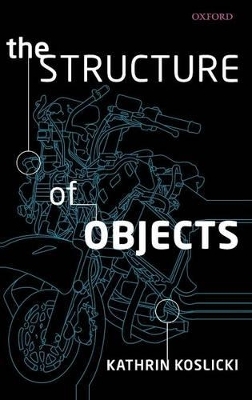
The Structure of Objects
Seiten
2008
Oxford University Press (Verlag)
978-0-19-953989-5 (ISBN)
Oxford University Press (Verlag)
978-0-19-953989-5 (ISBN)
Kathrin Koslicki offers an analysis of ordinary material objects, those material objects to which we take ourselves to be committed in ordinary, scientifically informed discourse. She focuses particularly on the question of how the parts of such objects are related to the wholes which they compose.
Kathrin Koslicki offers an analysis of ordinary materials objects, those material objects to which we take ourselves to be committed in ordinary, scientifically informed discourse. She focuses particularly on the question of how the parts of such objects are related to the wholes which they compose.
Many philosophers today find themselves in the grip of an exceedingly deflationary conception of what it means to be an object. According to this conception, any plurality of objects, no matter how disparate or gerrymandered, itself composes an object, even if the objects in question fail to exhibit interesting similarities, internal unity, cohesion, or causl interaction amongst each other.
This commitment to initially counterintuitive objects follows from the belief that no principled set of criteria is available by means of which to distinguish intuitively gerrymandered objects from commonsensical ones; the project of this book is to persuade the reader that systematic principles can be found by means of which composition can be restricted, and hence that we need not embrace this deflationary approach to the question of what it means to be an object.
To this end, a more full-blooded neo-Aristotelian account of parthood and composition is developed according to which objects are structured wholes: it is integral to the existence and identity of an object, on this conception, that its parts exhibit a certain manner of arrangement. This structure-based conception of parthood and composition is explored in detail, along with some of its historical precursors as well as some of its contemporary competitors.
Kathrin Koslicki offers an analysis of ordinary materials objects, those material objects to which we take ourselves to be committed in ordinary, scientifically informed discourse. She focuses particularly on the question of how the parts of such objects are related to the wholes which they compose.
Many philosophers today find themselves in the grip of an exceedingly deflationary conception of what it means to be an object. According to this conception, any plurality of objects, no matter how disparate or gerrymandered, itself composes an object, even if the objects in question fail to exhibit interesting similarities, internal unity, cohesion, or causl interaction amongst each other.
This commitment to initially counterintuitive objects follows from the belief that no principled set of criteria is available by means of which to distinguish intuitively gerrymandered objects from commonsensical ones; the project of this book is to persuade the reader that systematic principles can be found by means of which composition can be restricted, and hence that we need not embrace this deflationary approach to the question of what it means to be an object.
To this end, a more full-blooded neo-Aristotelian account of parthood and composition is developed according to which objects are structured wholes: it is integral to the existence and identity of an object, on this conception, that its parts exhibit a certain manner of arrangement. This structure-based conception of parthood and composition is explored in detail, along with some of its historical precursors as well as some of its contemporary competitors.
Kathrin Koslicki is Associate Professor of Philosophy at the University of Colorado, Boulder. Her interests are metaphysics, philosophy of language, and ancient Greek philosophy, particularly Aristotle.
1. STANDARD MEREOLOGY ; Introduction ; 1. The Standard Conception of Composition ; 2. Ordinary Material Objects as Mereological Sums ; 3. Composition as Non-Identity ; 2. A CONTEMPORARY STRUCTURE-BASED MEREOLOGY ; 4. A Different Kind of Whole ; 3. ANCIENT STRUCTURE-BASED MEREOLOGIES ; 5. The Role of Structure in Plato's Mereological Writings ; 6. Aristotle's Refinements of Plato's Theory ; 4. AN ALTERNATIVE STRUCTURE-BASED THEORY ; 7. Objects as Structured Wholes ; 8. In Defense of Kinds ; 9. Structure ; Conclusion ; Bibliography ; Index
| Erscheint lt. Verlag | 17.4.2008 |
|---|---|
| Verlagsort | Oxford |
| Sprache | englisch |
| Maße | 164 x 242 mm |
| Gewicht | 596 g |
| Themenwelt | Geisteswissenschaften ► Philosophie ► Erkenntnistheorie / Wissenschaftstheorie |
| Geisteswissenschaften ► Philosophie ► Metaphysik / Ontologie | |
| Geisteswissenschaften ► Philosophie ► Philosophie Altertum / Antike | |
| Geisteswissenschaften ► Philosophie ► Sprachphilosophie | |
| ISBN-10 | 0-19-953989-8 / 0199539898 |
| ISBN-13 | 978-0-19-953989-5 / 9780199539895 |
| Zustand | Neuware |
| Haben Sie eine Frage zum Produkt? |
Mehr entdecken
aus dem Bereich
aus dem Bereich
die Grundlegung der modernen Philosophie
Buch | Softcover (2023)
C.H.Beck (Verlag)
CHF 25,20
Buch | Softcover (2023)
Reclam, Philipp (Verlag)
CHF 9,80

![Was heißt Denken?. Vorlesung Wintersemester 1951/52. [Was bedeutet das alles?] - Martin Heidegger](/media/113619842)
